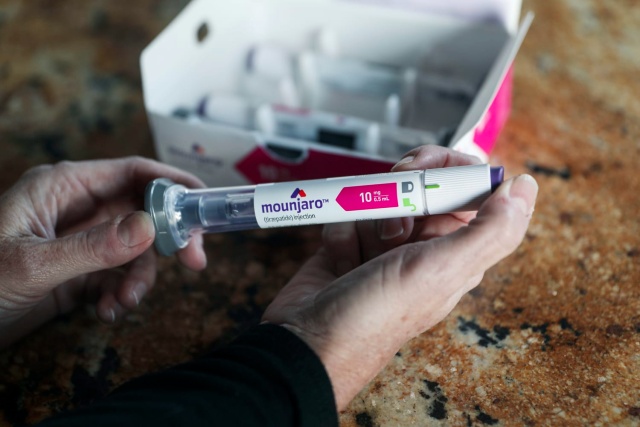An injection known by the brand name Mounjaro (tirzepatide) is indicated for individuals with type 2 diabetes. Similar to other medications, Mounjaro side effects may include nausea, diarrhea, lack of appetite, and many more.
Common side effects of Mounjaro:
Certain side effects are possible with Mounjaro, some of which are more common than others. Those who used Mounjaro in clinical trials experienced the following common side effects:



- nausea
- diarrhea
- loss of appetite
- vomiting
- constipation
Note: Mounjaro side effects could only last a few days or weeks. However, be sure to contact your doctor or pharmacist if the adverse effects worsen, persist longer than expected, or worry you.
Mild side effects of Mounjaro:
There may be mild side effects when using Mounjaro. Not all of the medication’s mild side effects are included in the list below. Among the mild side effects of Mounjaro that have been recorded are:
- indigestion
- discomfort in the abdomen
- belching
- acid reflux
- swelling in the abdomen
- mild allergic response
- mild injection site reaction
Serious side effects of Mounjaro:
Mounjaro may result in several serious side effects. Not all of the medication’s potentially dangerous adverse effects are included in the list below. The following are serious side effects of Mounjaro that have been reported:
- thyroid cancer risk
- severe digestive issues that might cause an acute kidney injury
- issues with the gallbladder
- pancreatitis
- extreme allergic response
Inform your doctor as soon as possible if you have any severe adverse effects after taking Mounjaro. Call 911 or your local emergency number right away if you believe you are experiencing a medical emergency or if the side effects appear life-threatening.
Learn more about these side effects:
Risk of thyroid cancer
The Food and Drug Administration (FDA) has issued a boxed warning on Mounjaro citing the possibility of thyroid cancer. Doctors and patients are informed about the most significant side effects that particular medications may produce via boxed warnings.
Tirzepatide, the main ingredient in Mounjaro, has been linked to an elevated risk of several thyroid malignancies in animal studies. This includes medullary thyroid carcinoma (MTC), a particular kind of malignancy. On the other hand, human-drug interactions are not usually predicted by animal research. Whether Mounjaro also raises a person’s risk of thyroid cancer is unknown at this time. Thyroid cancer symptoms include:
- having trouble swallowing
- breathlessness
- hoarseness
- strange growth or bump in your neck
Before starting this medication’s therapy, disclose to your doctor any personal or family history of MTC. They usually won’t provide Mounjaro or a comparable medication for your disease because of this danger. Furthermore, if you have multiple endocrine neoplasia syndrome type 2 (MEN2), a kind of cancer, or if you have already had it, they often won’t prescribe Mounjaro.
Severe digestive problems
As a result of using Mounjaro, various digestive issues may arise. These were the most common side effects of Mounjaro observed throughout clinical studies. These digestive issues are rarely very serious.
Mounjaro has been linked to several potentially serious digestive issues, including nausea, diarrhea, and vomiting. Acute kidney injury (AKI) can result from dehydration brought on by severe intestinal issues. Weakness, less frequent urination, and disorientation are signs of AKI.
Gallbladder problems
Problems with the gallbladder may arise when receiving Mounjaro therapy. Patients in clinical studies experienced issues such as gallstones and bile duct obstruction. Gallstones or bile duct obstruction can cause the following symptoms:
- discomfort in your upper abdomen that might perhaps go to your back
- reduced hunger
- clay-colored stools
- jaundice
Pancreatitis
Mounjaro may be the cause of pancreatitis, which is inflammation and swelling of the pancreas. This side effect was allegedly uncommon throughout the drug’s clinical testing. Pancreatitis can be fatal in extreme circumstances.
Pancreatitis can cause significant stomach discomfort that may radiate to your back along with vomiting. It’s unknown if having pancreatitis in the past increases your likelihood of experiencing this adverse effect.
Allergic reaction
Like other medications, Mounjaro may produce an adverse response in certain individuals. Clinical trials, however, hardly ever revealed this adverse impact. Some symptoms include:
- skin rash
- itching
- flushing
Anaphylaxis, a more severe allergic response, is uncommon but can occur. Severe allergic reaction symptoms might include:
- swelling under your skin, usually in your hands, feet, lips, or eyelids
- swelling in your mouth, tongue, or throat, which can make breathing difficult
How long do Mounjaro’s side effects last?
A handful of the Mounjaro side effects could only last a few days or weeks. For example, if your body adjusts to the medication, you could have some common side effects like nausea or diarrhea.
On the other hand, some other serious side effects of Mounjaro could linger longer. The following are a few long-term adverse effects from Mounjaro’s clinical trials:
- serious digestive issues that might cause kidney damage quickly
- pancreatitis
These side effects are not common in clinical trials, but they are possible. It may take a long time to cure these side effects, as they may not go away.
Does Mounjaro make you tired?
Mounjaro’s clinical studies did not report any cases of tiredness or exhaustion. On the other hand, fatigue might be brought on by some of Mounjaro’s side effects. For example, fatigue may result from pancreatitis, nausea, vomiting, or loss of appetite.
Additionally, using Mounjaro together with other diabetic drugs may cause low blood sugar, which might cause fatigue as a symptom.
Talk to your doctor if you’re experiencing fatigue while receiving Mounjaro therapy. They can assist in identifying potential reasons and strategies to lessen your weariness.
Is low blood sugar a side effect of Mounjaro?
No, low blood sugar, or hypoglycemia, is not a typical side effect of Mounjaro by itself. When type 2 diabetes was treated with Mounjaro alone, there was no report in clinical studies.
However, when Mounjaro was used in conjunction with a few other type 2 diabetes medications, reports of low blood sugar were made. These additional drugs include sulfonylureas, including glipizide-containing Glucotrol XL. Moreover, they consist of insulins such as insulin degludec (Tresiba) or NovoLog and insulin aspart (Fiasp).
Low blood sugar symptoms include:
- tremors
- sweating
- hunger
- weakness
- dizziness
Inform your doctor about all of the drugs you take before beginning Mounjaro therapy. Talking about any other type 2 diabetes drugs you use is really essential. Your doctor may reduce the dosage of any insulin or sulfonylurea you are taking. This may lessen your chance of experiencing hypoglycemia while receiving Mounjaro therapy.
Precautions for Mounjaro:
Before beginning Mounjaro therapy, there are a few things to think about and go over with your doctor.
Alcohol and Mounjaro:
Alcohol and Mounjaro do not appear to interact in any way.
If you have diabetes, alcohol use may result in hyperglycemia (high blood sugar) or hypoglycemia (low blood sugar). Mounjaro is recommended to individuals with type 2 diabetes to help control blood sugar levels.
Furthermore, alcohol consumption may obstruct the recognition of certain illnesses’ symptoms. Your doctor might advise restricting alcohol intake while undergoing therapy because of these factors. Consult your physician or pharmacist if you have any concerns about consuming alcohol while taking Mounjaro medicine.
Pregnancy and breastfeeding while taking Mounjaro
It is unknown if taking Mounjaro while pregnant is safe. On the other hand, uncontrolled diabetes during pregnancy raises the possibility of both pregnancy loss and premature labor.
Consult your doctor if you are or want to become pregnant. They can provide you with safe prenatal diabetes treatment recommendations.
Additionally, it is unknown if nursing a child while receiving Mounjaro therapy is safe. Inform your doctor if you are nursing or want to start. They can discuss the advantages and disadvantages of nursing while receiving therapy. They can also offer you advice on safe feeding practices for your kid if needed.
Conclusion:
Side effects are possible with Mounjaro, they are often mild and disappear with regular treatment. Although rare, serious side effects are possible with Mounjaro. See your physician or pharmacist for further information if you’d like to know about the side effects of Mounjaro. They can assist you with any inquiries you may have regarding the drug’s negative effects.

